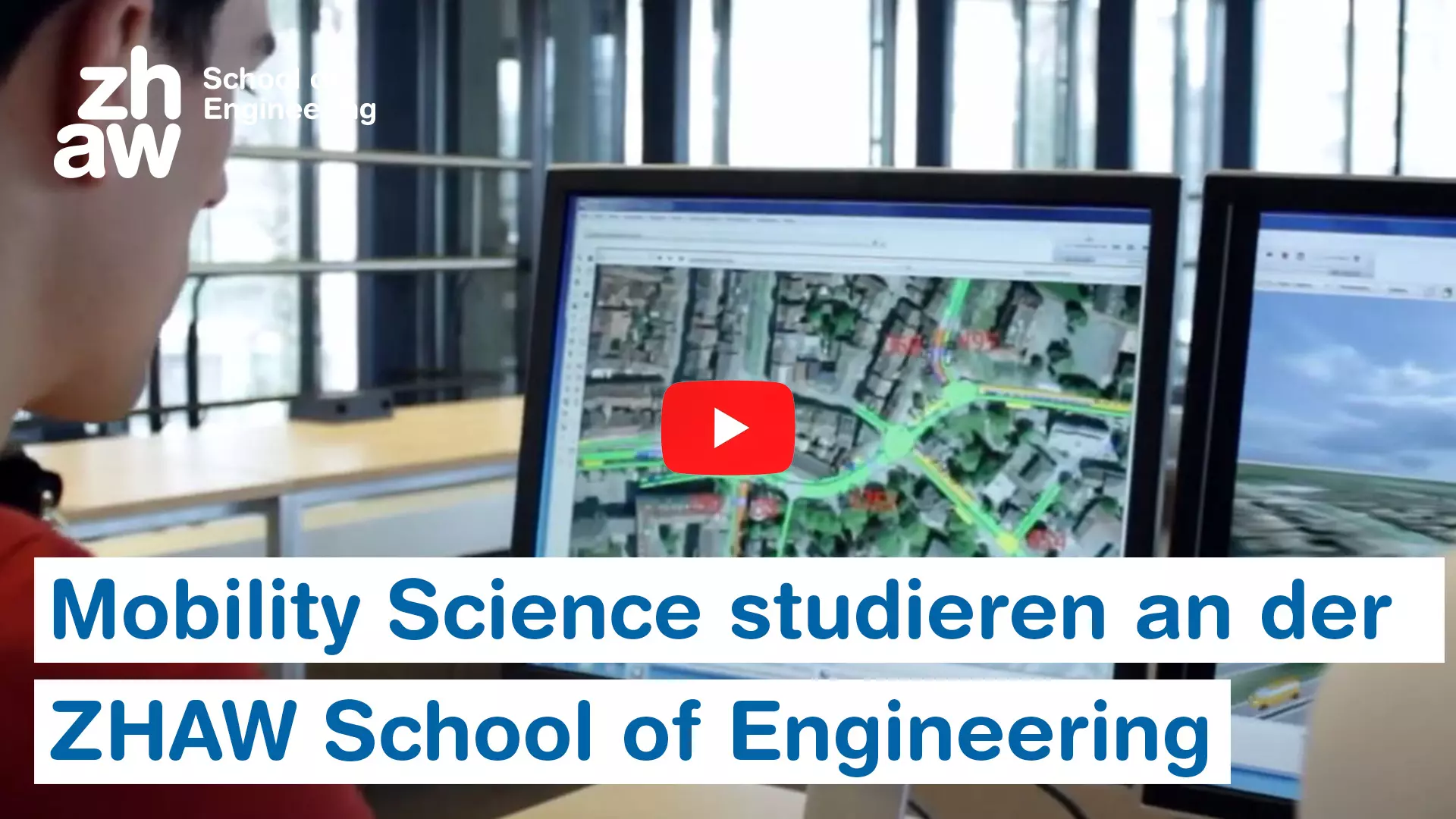Bachelor's degree Mobility Science

“Whether rail or road transport, we must always be in a position to view the system as a whole. Those studying Mobility Science confront new ideas and concepts without losing sight of the overall situation.”
Jacqueline Keller, ZHAW graduate and service planner at Südostbahn
Portrait
Good reasons for choosing the Bachelor's degree programme in Mobility Science
- A study programme developed in collaboration with leading professionals and specialists from industry, government and associations
- Excellent job prospects in a field with relevance for the future
- Combining a respected education programme in engineering with foundational knowledge and methodological skills in the area of Mobility Science
Film about the Mobility Science Bachelor's degree programme
At a glance
Title: Bachelor of Science in Mobility Science UAS Zurich
Workload: 180 ECTS-Credits
Duration: 6 Semester
Study model: Full-time programme, Practice-integrated Bachelor programme
Modules in English: Fall semester(PDF 521,5 KB), Spring semester(PDF 513,4 KB) (for more information please visit International Office)
Start of Program: Autumn
Application deadline: 30. April
Location: Winterthur
Language of Instruction: German
Semester Fee: CHF 720 per Semester + additional study costs
Graduate programmes: Master of Science in Engineering (MSE)
Admission: Admission Requirements
Curriculum content of the Bachelor's degree programme in Mobility Science
Mobility is a major factor in an affluent society. Today, the pace of travel is increasingly fast and greater distances are covered. With the globalisation of trade, production and services, international exchange of goods is also on the rise. The Mobility Science study programme addresses the entire rail- and road-based transportation system, looking at both public and motorised private transport. By developing sustainable passenger and cargo transport systems as well as optimising procurement, production and distribution concepts, graduates of the programme can make a considerable contribution to shaping our future.
Highly qualified engineers who can develop and implement complex solutions are needed to master today's technical, economic and environmental challenges. Applications include new supply concepts for rail and bus systems, the design of logistic value chains at industrial and service companies, and the creation of mobility offers in city districts.
Study models
The Bachelor's degree programme can be completed on either a full-time basis, with a duration of three years, or on a part-time basis, with a minimum duration of four years. A maximum employment level of 60% during the lecture period is recommended to students wishing to work while studying part-time.
Graduates of Swiss baccalaureate schools can choose the work-study Bachelor's degree programme, which combines internships and study in a four-year model.
Students have the opportunity to spend an exchange semester at one of our partner universities during the course of their Bachelor's degree programme.

"Helping to actively shape the future of mobility in a way that is relevant to society motivated me to opt for this degree programme and still drives me today."
Martin Grolimund, graduate in Mobility Science and execution project manager at SBB Infrastructure
Internship prior to starting the Bachelor's degree programme
In order to begin studying in the Bachelor's degree programme in Mobility Science, it is beneficial to have completed a one-year internship prior to the study programme. Holders of a Swiss baccalaureate must provide proof of professional experience lasting at least 12 months. We are happy to help students find suitable internships.
In general, we recommend the following online platforms when searching for an internship:
- Internship portal of the Swiss association of transport engineers and experts (in German and French)
- Internship portal of the training association "login" (in German, French and Italian) (commercial internships but may be suitable for individual cases)
- www.bahnjobs.ch (in german)
- Job portal Absolvententag ZHAW (in german)
Students who have difficulty finding a good solution should feel free to contact us.
Professional relevance
The Bachelor's degree programme in Mobility Science is highly relevant to professional practice. From the very first semester, students have the opportunity to apply the knowledge acquired in the scope of practice-based projects. In the project and Bachelor's thesis at the end of the study programme, students work independently on current topics and questions, often in collaboration with a company.
Topics surrounding mobility are a major research area of the ZHAW School of Engineering. The lecturers in the Mobility Science study programme are also active in research and development, and the findings from their projects – generally completed together with business partners – are directly incorporated into their teaching.
You may also be interested in
Admission requirements
The requirements for admission to the Bachelor programme at the ZHAW School of Engineering.
How to prepare yourself for the Bachelor programme
Learn how you can best prepare yourself for the Bachelor programme.
Application for the Bachelor programme
Admission requirements
How to prepare yourself for the Bachelor programme
Apply for the Bachelor programme today.
The requirements for admission to the Bachelor programme at the ZHAW School of Engineering.
Learn how you can best prepare yourself for the Bachelor programme.

